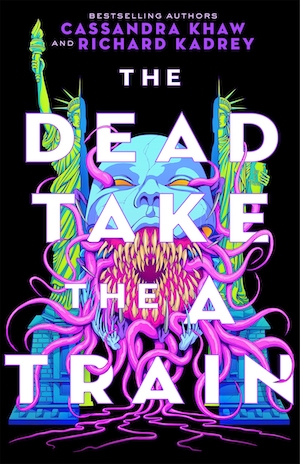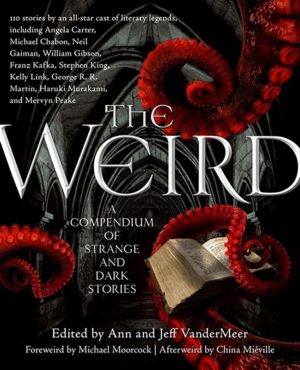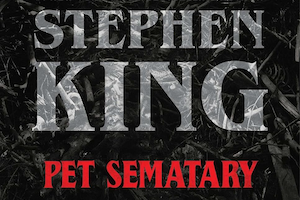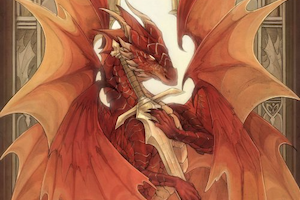Welcome back to Reading the Weird, in which we get girl cooties all over weird fiction, cosmic horror, and Lovecraftiana—from its historical roots through its most recent branches.
This week, we cover K.J. Bishop’s “Saving the Gleeful Horse,” first published in Fantasy Magazine in 2010. You can also find it in The Weird. Spoilers ahead!
“Never did dreams supply such a zoo of little spotted and striped horses and chequered gazelles, sky-blue lions, dawn-pink bears, gallant golden beetles, chivalrous silver anteaters!”
Molimus lives in the village of Bracklow, in a hut under the bridge. His massive height and strength have earned him the nickname Molimus the Great, but he earns his living by trading flotsam he fishes from the river. Sometimes, especially on holidays, he sees the husks of dead animals float by.
If one doubts children are cruel, watch how they beat these animals—rare, marvelous creatures—to bursting death. Hear how they laugh, see how their eyes shine, even before their victims spill out caramels, toys and trinkets! Then they toss the corpses into the river, unsalvageable even by Molimus. Their substance is so diaphanous it dissolves in the water like “bread in soup.”
One October night, Molimus sees a still-living animal in the stream, a little horse “banded in red, blue, white and gold like the flag of some merry knight,” its legs churning, its head turning to him with a game grin. Molimus rescues the horse and dries him before his fire. He names the creature the Gleeful Horse, binds his wounds, tries to feed him, but though of “steady good cheer,” Gleeful eats nothing.
Seeking help, Molimus takes Gleeful to the Garth of the Aorist and a stone cloister enclosing a bramble-choked garden. When he walks around the cloister a certain number of times, the brambles slither into the ground to reveal a lush lawn with a “rose-bosomed” hut in its center. Molimus enters and doffs his cap to the woman (or “woman-shaped thing”) sitting cross-legged before a painted hearth. She is the White Ma’at, behind whose tall blue-veined forehead is “a cellar provisioned with all the vintages of magic.” Her vision is obscured by “milky cataracts,” but still she sees all, including Molimus’ thoughts.
Gleeful has no fear of the Ma’at, even when she pries open his mouth to extract a plastic “emerald” ring. When a “treasure animal’s” last treasure’s gone, she says, it dies. She replaces Gleeful’s ring. Molimus sits Gleeful on his lap, hoping for a healing charm. Instead the Ma’at tells him not to blame the children for Gleeful’s sorry state, for they don’t see treasure-animals as alive. Molimus, with “a foot in both worlds,” sees them differently, but his eyes are clouded by “a picture of cruelty on the inside”.
Molimus senses that the Ma’at is uncharacteristically anxious. Ages back she lost a battle to Prince November and was sentenced to death but, ever a great bargainer, she made a deal with the Prince to remain forever confined to her cloister-prison. In return, gossip breathes, he drinks knowledge from her veined forehead. No wonder she’s anxious, and bored. Perhaps Molimus can trade a wonder-tale for assistance, and so he begins a story about how happiness and delight departed the world before even the Ma’ats rose and fell, and how Gleeful Horse will bring happiness back.
The Ma’at interrupts Molimus, amused. Imagine it, she declares, that the future should work through Molimus! But he can save Gleeful by replenishing his treasures, and not with trinkets. It’s trinkets children see when they plunder an animal, but the treasures are in truth animating, star-like pieces.
Molimus feels a qualm, as if the Ma’at lures him into shameful conspiracy. The shame seems a solid shape that rises in his gullet. He spits it out: a plastic ring studded with stones of “pure false red.” The Ma’at takes and vanishes the ring. That wasn’t a “star-like piece,” she assures Molimus, but something he’s better off without. The star-like pieces exist in all living things. Humans have bright ones, children the brightest, for age dims them “except in…certain geniuses and halfwits.” To obtain them, he must drink the Wine of Smoke, a potion she acquired centuries ago. She used it to escape November but found that even as smoke she couldn’t penetrate her cloister. It took a century of sorcerous meditation to return her to flesh. A non-sorcerer could never return, could even be shut in a bottle and buried for eternity; such would be Molimus’ fate if he broke his bargain with her.
Buy the Book


The Dead Take the A Train
Molimus drinks the Wine, transforms into smoke, and begins to gather star-pieces, always one for Gleeful Horse and one for the Ma’at. In the villages people begin closing their windows at night and hanging charms before their fireplaces. They whisper of a smoke that sticks to children’s lives and pulls them out. Anyone touched by the smoke sickens, becomes hollow like a wax-paper figure, and dies. The treasure-animal game loses popularity, replaced by a pageant in which the character Grinning Horse saves children by breathing in the predator smoke. He also opposes Prince No-Never and his old nurse, the Wheat Mate. It seems children dream of all these characters after the smoke visits them….
The Ma’at has grown queer on the star-motes she inhales from smoke-Molimus. The blue vein in her forehead has turned to “a lode of white gold” that waxes and wanes. Molimus believes that she’s made a new bargain with Prince November to repay her debts—certainly rumors of his visits to drink from her have increased.
Meanwhile, to Molimus’ delight, Gleeful Horse breathes in the “sun-kissed thistledown” of star-motes and capers around the bridge and docks, his hurts forgotten. He befriends all the cats and dogs, and old ladies feeding ducks make a great fuss of him.
Molimus remembers how the Ma’at said the future would work through him. He remembers his interrupted tale of the Gleeful Horse redeeming the world with joy. And he wonders whether what he imagined will indeed come to pass.
What’s Cyclopean: Molimus spits up a red plastic ring, “annular, with an embellishment on one side: a sort of ornamented sphincter.”
The Degenerate Dutch: Molimus is confident that children know the treasure horses are alive, and that their destruction is deliberate and malicious. Ma’at points out that seeing cruelty makes him incapable of seeing alternatives.
Anne’s Commentary
After reading “Gleeful Horse,” I read the author’s bio and wasn’t surprised to learn that Bishop is an artist as well as a writer. Her imagery pops off the page with all the vividness of the Horse’s papery particolored hide. Specifically, she’s a sculptor in bronze. Have a look at the pieces she displays on her web page. (Also check out Alise Muok’s illustration of “Gleeful Horse” that Bishop posts a short scroll down here.)
Bishop infuses her weighty medium with the expressive kineticism of ballet, of folk dance; she translates this visual sensibility into words on “Gleeful’s” every page, from the churning of the river-borne Horse’s striped legs to the way enchanted brambles withdraw, “all the thorny bundles coming apart and slithering below in one rush as if a giant in the earth had them on a rope.” Perhaps the giant’s related to the Nephilim from Genesis, who were “on the earth in those days” of Noah—the ease with which Bishop tosses off this allusion is admirable. Admirable, too, the sensual specificity of such descriptions as the ones that convince us Molimus is BIG: “My shirt is made of four men’s shirts sewn together, and an eight-pound cheese wheel fits in the palm of my hand.” The dude handles massive cheese rounds the way we’d handle a mini Bonbel! And probably eats them in two casual bites as well.
No wonder Bracklowers call him Molimus the Great. There’s probably some irony intended, because no matter how great Molimus is in size, he’s small in status, living in a hut under a bridge and scraping along by peddling the junk he scoops out of the river at the Paupers’ Forum. Villagers may consider him a half-wit. If so, he’s the kind of half-wit the Ma’at pairs with geniuses, in that both retain the brilliance of their star-pieces into adulthood. In his solitude, Molimus ponders the cruelty of children. Probably they’ve always tormented him as a freak and dimmed his eyes with the “picture of cruelty” Ma’at perceives as his default filter, the crap-colored lenses through which he views the world. Yet he sees “rare, marvelous” beauty as well, at least in the “treasure-animals” who are living beings to him—as he is a living being replete with treasures which lose their value when plundered.
Don’t tell Molimus no real animals were harmed in the cause of entertaining kids. Not even the Ma’at can convince him of this. Nor can he accept that only he and the Ma’at, with a foot in both worlds, can see the treasure-animals are alive. The children know what’s alive, and they want to kill it. Is he delusional, projecting his own plight on mere pinatas? Is the Ma’at stringing him along for her own purposes by conceding that in one world the animals are animate? Molimus notices she seems different, “unstrung,” “distracted,” “infirm,” conditions that should never trouble an unchanging sorceress. He needs healing for Gleeful Horse. Perhaps the Ma’at needs healing for herself, renewed strength. Fresh “elements,” “starlike pieces,” life essence.
Because she knows Molimus’ thoughts, she can manipulate them. It’s irrelevant whether the treasure-animals are inanimate or quick. If the former, her magic can turn Gleeful Horse into a convincing automaton, powered by star-pieces. If the latter, the star-pieces can gift it with the vitality properly belonging to it only in the other world. The point is to assure Molimus she’s keeping her end of their bargain. She’s saving Gleeful Horse. Now Smoke Molimus, he’s supplying her with star-pieces, which she may pass on to November to installment-buy her freedom. Her forehead vein, once blue with wisdom, has become “a lode of white gold: often swollen, but sometimes flat.” The logical conclusion is that what Smoke-Molimus sucks from the children, the Ma’at sucks from Smoke-Molimus, and November sucks from the Ma’at.
They’re a fine codependent trio of vampires. Or a quartet, if Gleeful Horse is alive.
Or…undead?
He seems like such a nice painted pony, though. The old ladies dote on him. Dogs and cats like him, who will tolerate nothing uncanny. Dogs won’t, anyhow. See Benson’s “Room in the Tower” for another verdict on feline affinities.
For all her machinations, the Ma’at doesn’t appear to have profited from her latest bargain. If she was slipping into senescence before “saving” Gleeful Horse, she’s only slipped further since. The net energy she obtains by inhaling Smoke-Molimus’ “lovely motes” must be less than the net energy she surrenders to November. The children are bigger losers yet as they succumb to the “emptying sickness.” In the revenge Smoke-Molimus wreaks on them and the joy he takes from Gleeful’s real or illusory vitality, he’s the biggest winner in Bishop’s game.
It sure isn’t the pinata-maker’s guild. On the other hand, sellers of pageant paraphernalia profit from the slumping demand for treasure-animals, as must be the makers of diminutive coffins.
The last paragraphs of “Gleeful Horse” provide a fitting close for The Weird anthology. Molimus recalls that his “never-finished tale” sounded true as he was telling it, making him hope it will all be as he imagined. Can writers, and readers, ask for more?
Ruthanna’s Commentary
As I write this, I keep glancing up at a smallish tyrannosaurus rex, red and blue, weighted down with about ten pounds of cheap candy. It’s the survivor(?) of my eldest child’s birthday party, perhaps kept alive(?) by my co-parents’ determination that if you have a four-foot pinata, you must have enough candy to fill it regardless of the number of guests anticipated. I’m grateful to K.J. Bishop for making me feel at least marginally better about this monstrosity taking up one of my chairs, even while making me feel worse about pinatas in general.
Maybe if I show my co-parents this story, the next party will not feature a giant pinata?
The VanderMeers call this story neo-decadent, or just decadent. I associate the concept of decadence primarily with early (and occasionally late) racist theories of civilizational growth and decay, like that referenced in Lovecraft and Bishop’s (no relation) “The Mound.” Decadent civilizations, according to these theories, rest amid the circuses made possible by their laurels, even as everything that made them great decays around them. They choose excess over self-control, glamour over values. Possibly they eat people, if people are available for consumption.
As an art movement, decadence—19th century version—reveled in excess and glamour. The extravagant language, in particular, fed into the cyclopean adjectivophila of weird fiction. As best as I can infer, neo-decadence still revels in glamour, but uses it to comment on societal decay. An attempt to nail it down retrieves a book entitled Neo-decadence: 12 Manifestos. Editor Justin Isis, in the book’s intro, says “The early 21st Century: a gilded age of pious guilt, poison nostalgia, environmental collapse, unchecked pandemics, corporate franchises, workshopped creativity and personal brands. Standing against the Neo-Passéist tide, Neo-Decadence presents a total reformulation of everyday life,” and says it’s “as much a personal style guide as it is a declaration of uncompromising aesthetic war.” Perhaps that’s what Molimus is doing: a war for aesthetics in the form of the treasure animals.
Circling back to pinatas, which I had to do eventually, Bishop (K.J.) fills these ephemeral objects with deep meaning that just might fall out if we whack at it hard enough. I don’t much like the game of is this fantastical premise real—though I’m intrigued by Anne’s suggestion that Ma’at is real and the treasure animals illusion—so am generally assuming that Molimus the Great is not merely a traumatized guy dumpster diving in the river, but that his magical vision reflects something real: that the Gleeful Horse prances, the White Ma’at shares wisdom, and smoke steals children’s life force in exchange for visions. But as Ma’at points out, this doesn’t mean that Molimus sees everything.
Their discussion reminds me of Robert Anton Wilson’s concept of reality tunnels. All we perceive of the world is interpretation, shaped by expectation and belief and desire and fear as well as by the actual atoms of the local cosmos. So Molimus, who presumably suffered cruelty at the hands of other children when he was himself a young giant, sees deliberate cruelty in pinata-whacking, and none in killing thousands for the sake of the Gleeful Horse. He also sees things that others might not, even if standing in the same place. Especially once Ma’at takes his ring—his conscience? Or perhaps, given his transformation into smoke plague, his humanity.
The story of Ma’at and November, however warped in the telling, reminds me of the urban legends that spring up around playground games, or the more complex mythologies that children create and share amid crisis, making new reality tunnels to preserve meaning amid meaninglessness. Perhaps they’re a myth that Molimus—childlike himself even in his hatred for children—has brought to life with his own trauma, and his own need for meaning and explanation.
Neo-decadently, the smoke that is Molimus that is plague could also be pollution. Or media, taking time from children’s lives in exchange for visions. Or, or, or, any of the things on Isis’ list of 21st Century ills. Any of the dangers that happen when one person has the power to impose their fearful interpretations of reality on everyone else.
Next week, alarming letters continue to arrive in Chapters 7-8 of Max Gladstone’s Last Exit.
Ruthanna Emrys is the author of A Half-Built Garden and the Innsmouth Legacy series, including Winter Tide and Deep Roots. You can find some of her fiction, weird and otherwise, on Tor.com, most recently “The Word of Flesh and Soul.” Ruthanna is online on Twitter and Patreon and on Mastodon as [email protected], and offline in a mysterious manor house with her large, chaotic household—mostly mammalian—outside Washington DC.
Anne M. Pillsworth’s short story “The Madonna of the Abattoir” appears on Tor.com. Her young adult Mythos novel, Summoned, is available from Tor Teen along with sequel Fathomless. She lives in Edgewood, a Victorian trolley car suburb of Providence, Rhode Island, uncomfortably near Joseph Curwen’s underground laboratory.














